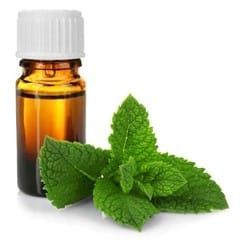

Symptoms of peppermint oil allergy affecting dogs may include skin irritation, coughing, sneezing, itchy eyes, vomiting, and diarrhea.
Peppermint oil allergy in dogs is often caused by an inhalation or ingestion of essential oils from peppermint plants, which can be found in many products such as shampoos and household cleaning products. The oil can also be found in foods or snacks such as candy, mints, or even some dog treats. Inhalation of the oil can cause irritation of the respiratory system, while ingestion can produce gastrointestinal irritation. Both of these effects can then lead to the symptoms listed above.
In order to diagnose a peppermint oil allergy in dogs, a veterinarian should take a complete medical history, including recent changes in the pet’s environment or diet. A physical examination should be conducted to look for symptoms of the allergic reaction such as skin irritation, coughing, sneezing, and itchy eyes. Additionally, diagnostic tests such as skin scrapings, blood tests, and urine tests may be necessary to confirm the diagnosis. If the veterinarian suspects food allergies, an elimination diet should be conducted to identify the trigger. In some cases, the veterinarian may also refer the pet to an allergy specialist for skin testing or other evaluations.
A peppermint oil allergy can cause serious discomfort for dogs, and if left untreated, can potentially be fatal depending on the severity of the reaction. The mortality rate of peppermint oil allergies would vary greatly depending on the individual dog.
The primary treatment for a peppermint oil allergy affecting dogs is to identify and remove the source of the exposure, as well as to immediately provide the dog with antihistamines to reduce irritation and discomfort. Additionally, topical corticosteroids may be used to reduce inflammation. If the symptoms persist or become more severe, it is best to seek veterinary care to diagnose and treat the allergy.
To prevent the symptoms of peppermint oil allergy affecting dogs, it is important to keep all potential sources of peppermint oil away from the dog, including foods, cleaning products, essential oils, and air fresheners. Additionally, if allergies are suspected, it is important to consult with a veterinarian to determine the proper course of treatment and identify any other potential allergens that could be causing the symptoms.
Peppermint oil allergies in dogs are not contagious and do not affect humans. However, humans may suffer from peppermint oil allergies as well.
Home remedies that may be useful in managing a peppermint oil allergy include limiting your dog’s exposure to the oil, using shampoos without essential oils, and monitoring your dog’s responses to any products that do contain essential oils.
While these home remedies may be helpful for managing a peppermint oil allergy, it’s important to consult with a veterinarian to ensure the best outcome for your dog.
Certain breeds of dogs, such as Shetland Sheepdogs, Shih Tzus, Bichon Frises, Toy Poodles, Lhasa Apsos, and Maltese, are all vulnerable to peppermint oil allergies. These breeds tend to have sensitive skin, making them more prone to any type of environmental irritant. Allergies to peppermint oil can cause skin irritation, itching, redness, and irritation around the face, ears, and neck. Most dogs with peppermint oil allergies can be successfully managed with proper nutrition and limited exposure to the oil.
Have you ever had to deal with a peppermint oil allergy in your dog? How did you respond, how did you feel, and how did you manage the process? We understand the difficulty of managing allergies and how hard it can be for both you and your pooch. We send our best wishes and hope you both get the support you need.